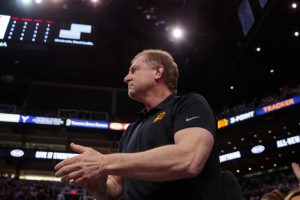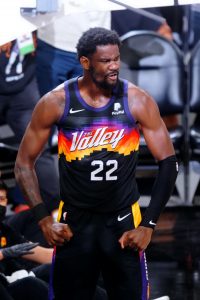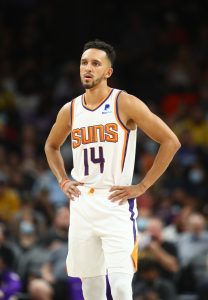5:02pm: The Suns have issued a statement:
“We understand that an outlet is considering publishing a proposed story that makes completely baseless claims against the Suns Legacy Partners, LLC organization concerning a variety of topics. Documentary evidence in our possession and eyewitness accounts directly contradict the reporter’s accusations, and we are preparing our response to his questions. We urge everyone not to rush to judgment here. Especially based on lies, innuendo, and a false narrative to attack our organization and its leadership.”
 The team has also put out a longer statement from Sarver himself. It reads as follows:
The team has also put out a longer statement from Sarver himself. It reads as follows:
“I am wholly shocked by some of the allegations purported by ESPN about me, personally, or about the Phoenix Suns and Mercury organizations. While I can’t begin to know how to respond to some of the vague suggestions made by mostly anonymous voices, I can certainly tell you that some of the claims I find repugnant to my nature and to the character of the Suns/Mercury workplace and I can tell you they never, ever happened.
“First and foremost, I reject any insinuation of personal or organizational racism or gender discrimination. I despite language that disrespects any individuals, regardless of race, gender, preference, or choice. Such language has no place in business or at home in what I consider Suns and Mercury families. I am proud of our record of diversity and inclusion on both teams — whether on the court or in the front office.
“I don’t begin to know how to prove that something DIDN’T happen, and it is difficult to erase or forget ugly accusations once they are made. Even hints of racism or sexism in our culture today are toxic and damaging and should not be lightly raised. I categorically deny any and all suggestions that I used disparaging language related to race or gender. I would like to think that my actions and public record regarding race, gender, or discrimination of any kind, over a lifetime in business and community service, will adequately answer any questions anyone might raise about my commitment to equality and fairness.”
Additionally, Phoenix published a brief statement from general manager James Jones, who said the allegations don’t describe the “the Robert Sarver, I know, respect, and like.” In a longer statement, team president and CEO Jason Rowley took aim at the ESPN reporter working on the story, claiming he has “shown a reckless disregard for the truth” and that his tactics have been “without any basis in journalism ethics or even morality.”
Again, it’s worth noting that no report has been published yet, so it remains unclear what sort of specific accusations or incidents Sarver and the Suns are denying.
4:09pm: The NBA is preparing for a “massive story” accusing Suns owner Robert Sarver of racism, sexism, and sexual harassment, sources tell veteran reporter Jordan Schultz (Twitter link). According to Schultz, a “series of incidents” are expected to be described in the forthcoming story.
If there’s enough evidence to support those claims, there’s a real chance the NBA would wrest control of the Suns from Sarver, according to Schultz. The league took that approach when recordings surfaced in 2014 of former Clippers owner Donald Sterling making racist comments, forcing Sterling to sell the team and banning him from the league for life.
It’s premature to speculate about whether the NBA will take the same path with Sarver, since we have no idea yet what the accusations will look like or how much evidence there will be to back them up. Until the full report Schultz alludes to is published, we’ll be in wait-and-see mode.
For what it’s worth, John Gambadoro of Arizona Sports 98.7 FM (Twitter link) hears that over 50 people were interviewed for the story, adding that Baxter Holmes of ESPN may be the reporter working on it.
Sarver became the majority owner of the Suns in 2004, when he purchased the franchise for a then-record $401MM. When Forbes released its annual NBA franchise valuations in February of this year, the outlet estimated that the Suns are worth $1.7 billion.
The Suns made it to the Western Conference Finals three times in Sarver’s first six years as the team’s owner, but experienced a lengthy playoff drought following that third Western Finals appearance in 2010. Phoenix finally ended its 10-year drought earlier this year when the club came within two wins of a title.
 For example, Suns center
For example, Suns center  4:20pm: The Suns are signing guard
4:20pm: The Suns are signing guard